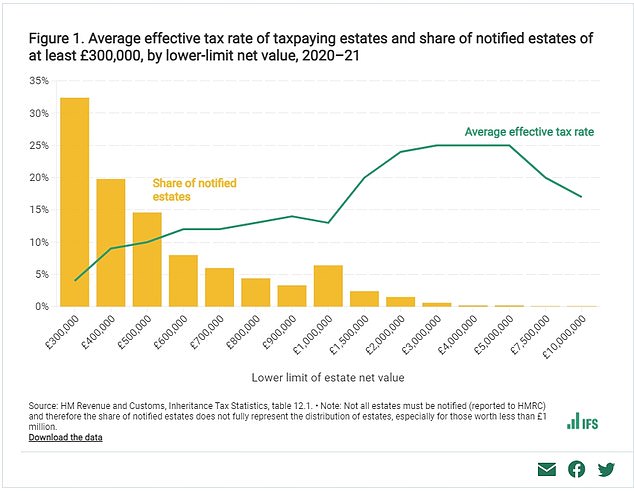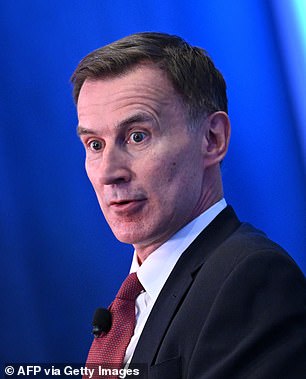End inheritance tax on pensions and other loopholes, says IFS
The government should stage an inheritance tax raid on unused pension pots and close other loopholes, says leading think tank the Institute for Fiscal Studies.
Pension pots fall outside the inheritance tax net and including them could bring in £200m of extra revenue for the government, the research shows.
Currently, the outstanding defined contribution pensions of loved ones who die before age 75 can be passed on tax-free, while the unused pension funds passed on by those who die after age 75 are subject to income tax on withdrawals.
But the IFS says the government should end the pension benefit and close other loopholes, impose IHT on AIM shares and limit support for business and agriculture.
Loophole: Pensioners who have enough money not to have to use their pension pot can use this as a way to avoid inheritance tax
The amount covered by the inheritance tax exemption will continue to grow, the Institute for Fiscal Studies has warned.
It said the government would generate £400 million in tax revenue between 2029 and 2030 if defined contribution pension pots were included in estates. And the IFS said the government could raise between £1 billion and £2 billion ‘over the coming decades’ if pension pots were made taxable.
The inheritance tax ‘carve-outs’ were criticized by the IFS, which said they allowed the very wealthy to pay significantly lower overall rates. Although passing on unused pension pots contributes to this, a large part comes from business support and the tax-free passing on of agricultural land.
The IFS said: ‘These reliefs are most commonly used by the largest estates. As a result, despite a nominal tax rate of 40 percent, the effective rate of inheritance tax paid peaks at 25 percent for estates worth between £3 million and £7.5 million, before falling to just 17 percent for estates worth from £10. million or more.’

Inheritance tax is charged at 40%, but only above the tax-free thresholds. This means that the average effective tax rate remains below this. But while it peaks for estates at between around £3 million and £5 million, it then starts to fall significantly due to tax planning by the very wealthy.
One criticism of the pension exemption is that it means wealthier individuals, who do not rely on their pot to fund their retirement, are advised to use it as a way to pass on wealth without the sting of inheritance tax.
Mubin Haq, CEO of abrdn Financial Fairness Trust said: “A key factor undermining support for taxes is the public perception that there are loopholes that a small minority takes advantage of.
‘That is the situation in the area of inheritance tax, where numerous exemptions are available. If some of the key exemptions are curtailed, the amount raised through inheritance tax could rise by more than a fifth.
‘That’s over £2 billion in extra revenue by the end of the decade, which could fund our overburdened public services.’
Unfair advantage or fair exemption? Pension pots and IHT
Currently, defined contribution pension pots – the most common type of occupational pension in Britain – can potentially be passed on tax-free when someone dies.
Pensions are excluded from inheritance tax, which is 40 percent, but may be subject to income tax.
For those who die before age 75, a pension pot can be exempt from income tax for its beneficiaries. Last year the government dropped plans to tighten rules on pensions inherited from people under the age of 75.
Those who die after the age of 75 will see their beneficiaries pay income tax on withdrawals from a passed-through pension pot, which can be charged at 20 percent, 40 percent or 45 percent.
Close the loopholes and reduce the tax rate?
The IFS says there are a number of other loopholes that also need to be closed.
It says this will make the system fairer and also raise money that could then be used to reduce the headline rate of inheritance tax from 40 percent.
Among the exceptions highlighted by the think tank, the ability to pass on agricultural land was highlighted.
This was created to prevent families from being forced to sell their farms, but has led to substantial investments in farmland by very wealthy individuals, who can then pass it on tax-free.
Instead of closing this loophole, an additional exemption was added in the spring budget, allowing agricultural land that is not being developed to be passed on tax-free.
This was put forward as a way to support conservation efforts.
Although it only represents a loss of around £5 million in income per year, the IFS claims the new exemption ‘illustrates a significant economic and political problem with an inheritance tax system that gives special treatment to some assets.’
“Once relief has been created, there are always arguments to expand its scope to avoid any unfairness at the margins. The root of the problem is primarily the creation of the special aid,” the IFS said.
It says the government is losing £400m every year from agricultural exemptions.

Losses: IFS says government could rake in billions if inheritance tax loopholes are reduced
David Sturrock, senior research economist at IFS, said: ‘Inheritance tax is littered with special exemptions and reliefs that make the tax unfair. The Spring Budget introduced another relief to this long list.
‘Rather than gradually removing more and more assets from tax, the government should take steps to reduce or eliminate some of the key exemptions in the system.
‘Eliminating the special treatment given to some shares, limiting exemptions for corporate and agricultural assets and bringing pension pots within the scope of tax would make the system fairer and increase revenues.’
Shares on the London Stock Exchange’s AIM market are completely tax-free if held for at least two years before someone dies.
This was intended to support support for smaller, riskier companies, but has also led to higher investment in these stocks among wealthy older people to capitalize. Removing this could raise £1.1 billion this tax year, the IFS says, rising to £1.6 billion in 2029-30.
Some links in this article may be affiliate links. If you click on it, we may earn a small commission. That helps us fund This Is Money and keep it free to use. We do not write articles to promote products. We do not allow a commercial relationship to compromise our editorial independence.
